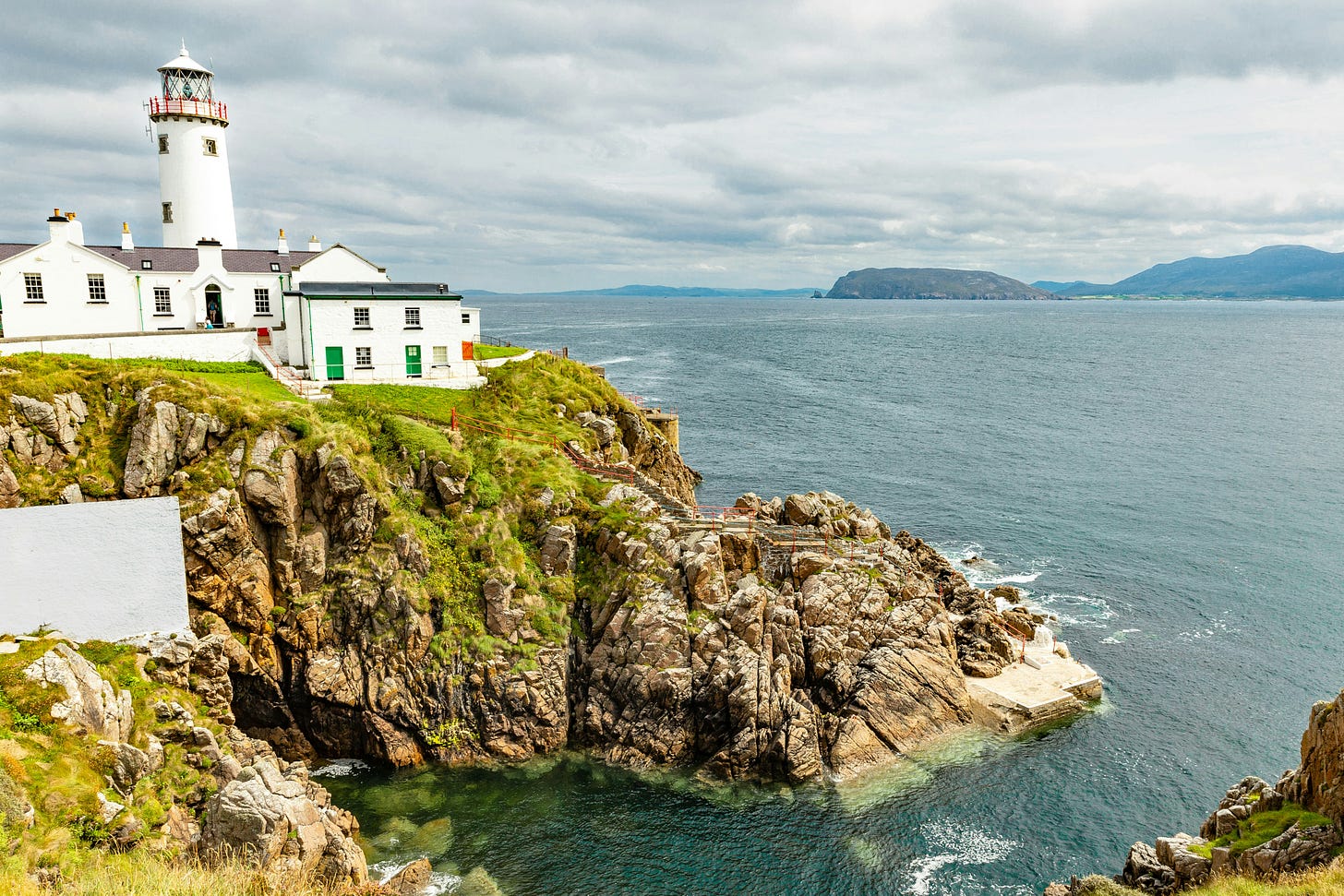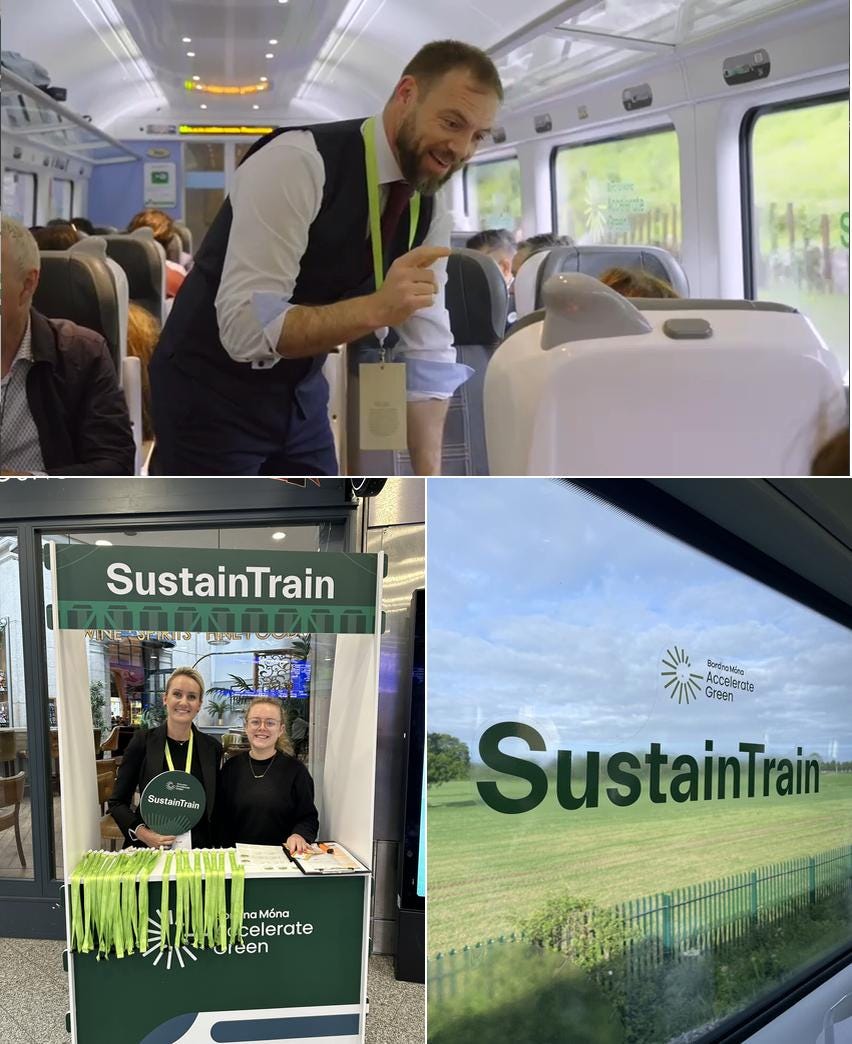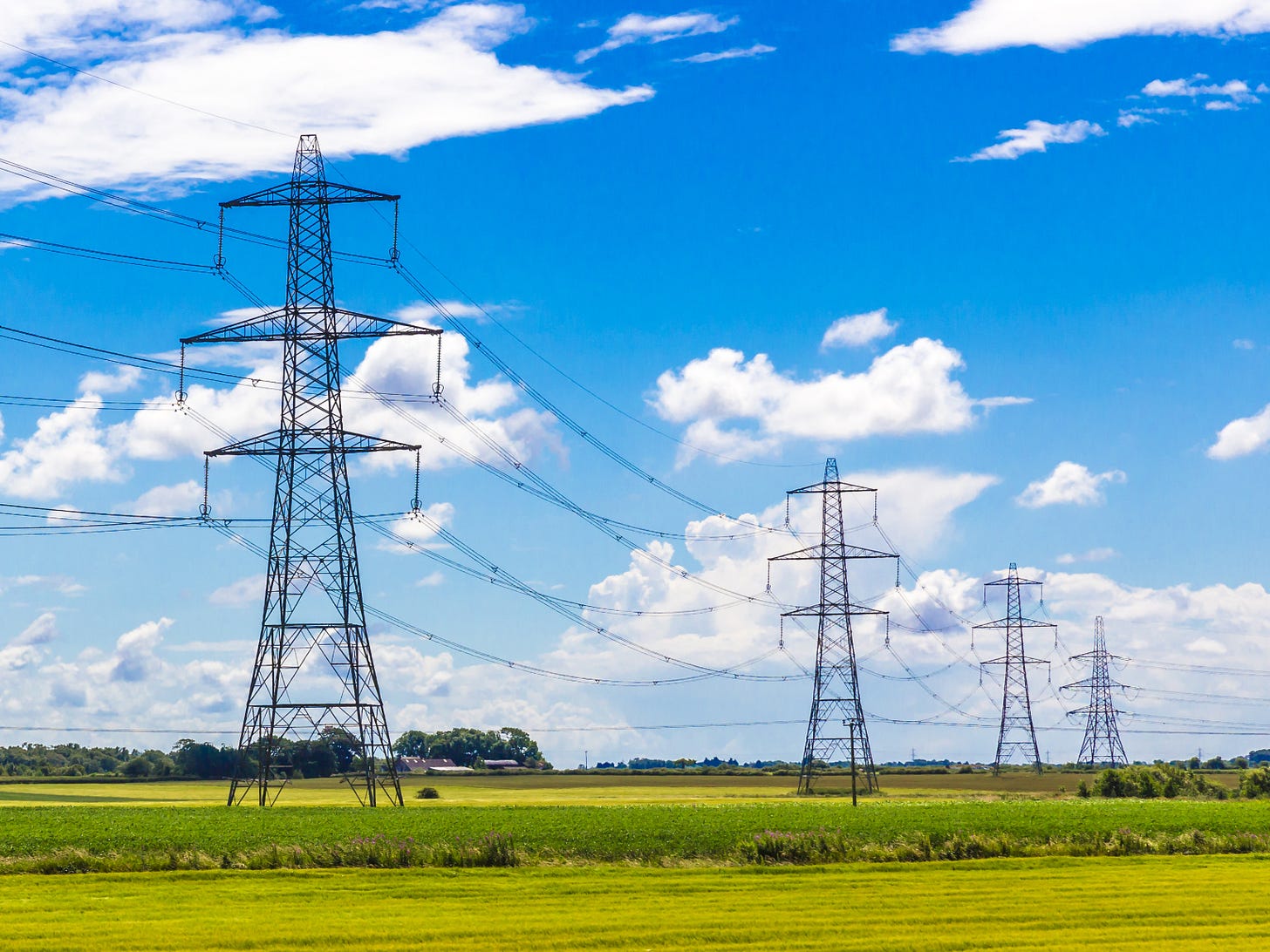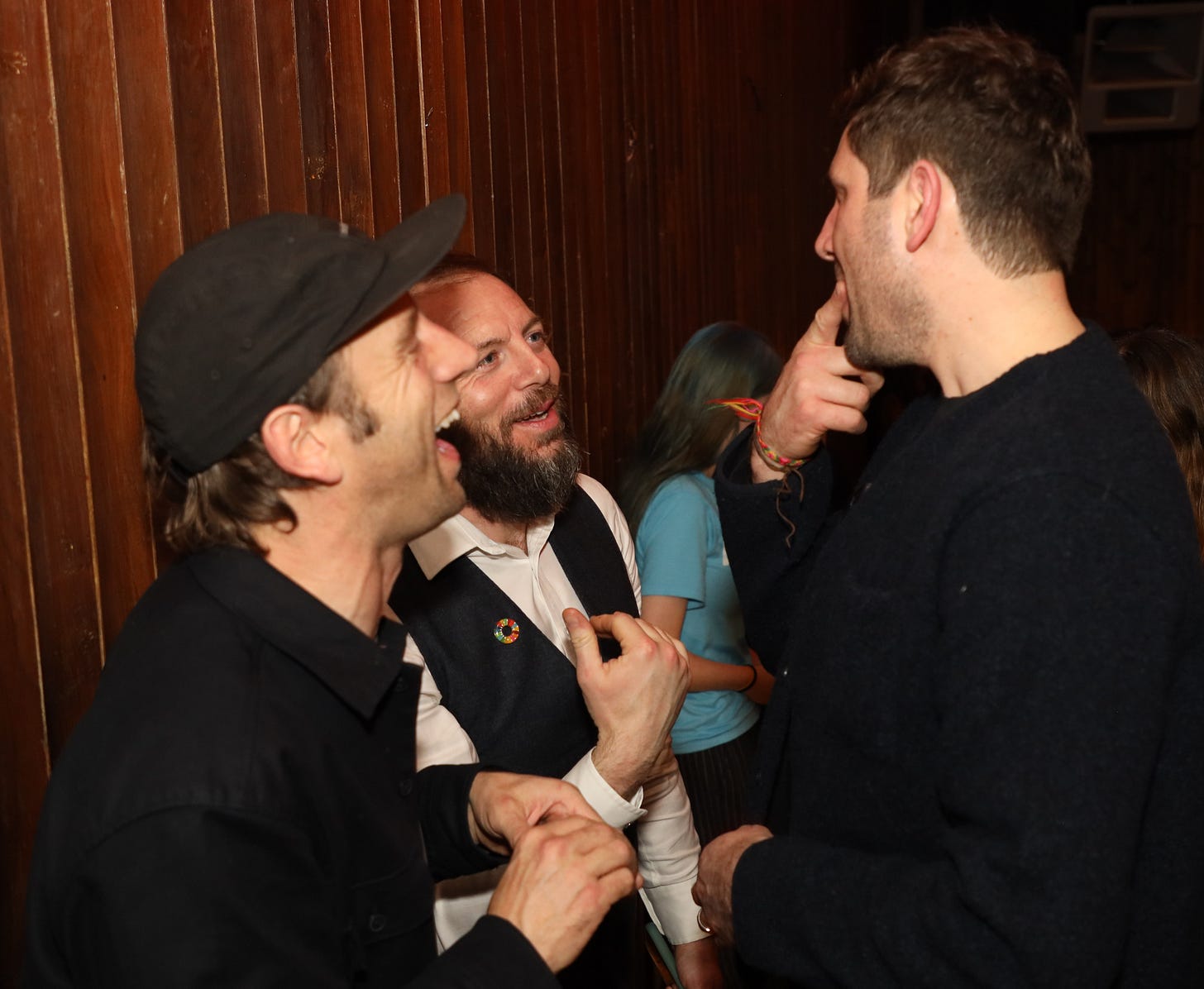Greetings,
At the risk of being accused of having a one-track mind, I’m going to take this opportunity to direct your attention to the upcoming BnM Accelerate Green Conference; in particular, the return of the inimitable SustainTrain.
There are many options to make your way to Tullamore on May 15th for the event, but none of them offer the SustainTrain’s unique mix of smug, self-satisfied sustainability along with absolute guaranteed craic. Once you’ve secured your registration to the Conference (mail me NOW for that all-important invite!), you can join us on the 07:35 Heuston to Tullamore service on the morning of the conference—stepping onboard the dedicated Conference Carriage, you’ll get:
🚂 free return tickets from Dublin Heuston to Tullamore;
🚂 complimentary breakfast treats;
🚂 world-class speakers and insights exclusively LIVE during the train ride;
🥳 and a guaranteed party atmosphere
Massive thanks to our friends at Irish Rail and CIÉ for sponsoring and supporting this micro-adventure, we really appreciate your generosity and vision!
Tickets at the ready, please…
Here’s the news round-up for Issue 88 of SDG Alpha:
I’ll start with a few infrastructure items: EirGrid has initiated a €1 billion procurement programme to develop Ireland's offshore electricity grid, focusing initially on the east coast. This investment aims to support the government's target of 5GW of offshore wind capacity by 2030 (more on that anon) , expanding to 37GW by 2050, though industry leaders express concerns over planning delays and policy uncertainties.
And while we’re on the subject of offshore wind… Corio Generation has halted its 450MW Sceirde Rocks offshore wind project off Ireland's west coast, citing engineering challenges and severe storm conditions—why this is coming as a surprise to anyone is beyond me. This decision undermines Ireland's renewable energy targets and ends potential community benefits, including €70 million in local funding: Government says that their strategy isn’t dependent on any single project, but this is undoubtedly a concern.
In much more positive news, the Greenlink electricity interconnector, a 190km subsea cable linking County Wexford to Pembrokeshire (recently sold for €1Bn to Equitix and Baltic Cable) is now fully operational. Enabling the transfer of 500MW of electricity—enough to power 380,000 homes—it’s a critical element of infrastructure and renewable energy integration between Ireland and the UK, and in turn on to to Europe.
Wrightbus is investing £25 million in R&D to accelerate the development of zero-emission buses, including a 200-mile range electric model and the UK's first hydrogen-powered coach capable of 1,000km per refuel. The funding also supports advanced vehicle testing and AI-driven telematics to enhance fleet efficiency and sustainability.
A couple of M&A updates to follow: Origin Enterprises, the Dublin HQ’d international agri-services group, has announced its acquisition of Scott Cawley Ltd, a specialist ecological consultancy. The integration of Scott Cawley's expertise is expected to provide comprehensive environmental solutions to clients, aligning with the increasing focus on ecological considerations in the agricultural sector.
Next, Canadian engineering giant Stantec has acquired Irish consultancy Ryan Hanley, marking a significant expansion of its footprint in Ireland. The move strengthens Stantec’s presence in water and infrastructure projects across the region, aligning with its broader European growth strategy.
ORS has snapped up two other Irish-based specialist consultancies—OCM and CCE—boosting its firepower in environmental services, energy efficiency, and sustainable building design. The move deepens its ability to support projects tackling waste, emissions, and green infrastructure.
Belfast’s Nuada has landed €2.5m from the ultra-competitive EIC Accelerator programme to scale its energy-efficient carbon capture tech, tackling emissions from hard-to-abate industries like cement and steel. It’s the first Northern Irish company to win this backing and follows a second recent EU award as the company ramps up commercialisation.
The Neart na Gaoithe offshore wind farm, located 15.5 km off the east coast of Scotland, has completed the installation of its 54th and final turbine. The 450 MW project—a JV between EDF Renewables UK and Ireland and the ESB—is anticipated to become fully operational in the coming months.
In some significant policy news, The Irish Government has approved the Climate Action Plan 2025 (CAP25), aiming to reduce greenhouse gas emissions by 51% by 2030 and achieve climate neutrality. The plan sets ambitious targets for renewable energy expansion, including significant increases in onshore wind, solar, and offshore wind capacities, while highlighting potential financial penalties for non-compliance. CAP25 also introduces sector-specific actions across electricity, transport, industry, buildings, and public sectors to ensure adherence to climate goals.
One of the critical parts of CAP25’s ability to deliver will rest on the State’s ability to streamline the planning process; no easy task, as the next few news items illustrate… First, a long-promised €350M cross-border electricity interconnector is being challenged in court by landowners in Armagh and Tyrone who argue the project mainly serves the Republic’s energy needs and threatens local communities. The developers say the pylons are critical to unlocking renewable energy and easing electricity constraints, but the case has stirred debate on who really benefits from big infrastructure. Two opinion pieces (one from MEP Sean Kelly, and the other from the Progress Ireland think tank) offer some background and alternative perspectives on this particular issue.
A proposed 250MW solar farm on Greenhills Farm in East Cork, one of Ireland’s largest dairy operations, has drawn criticism from local TD James O’Connor, who warns it could devastate the dairy industry by removing productive farmland and offering minimal economic returns to the community. While supporting smaller-scale solar initiatives, O’Connor argues that large-scale projects like this prioritise commercial electricity production over sustainable agriculture and local employment.
And opposition is mounting against the proposal by CycleØ to develop a biomethane plant in Ballyneety, Limerick—one of four planned for Ireland by the UK-based company—with local residents expressing concerns over potential environmental and health impacts. The plant, intended to process organic waste into renewable gas, has sparked fears about increased traffic, odour, and the suitability of the rural location.
GKinetic, the Limerick-based developer of hydropower solutions, has been shortlisted for the Tech4Good Global Challenge, a global call to find energy innovations that can help Ukraine’s grid infrastructure, which has been brutally targeted by Russian aggression. The initiative connects start-ups with donors and corporates to scale tech solutions not just for Ukraine, but for other crisis zones around the world. (GKinetic’s co-founder, Roisin Mc Cormack, was interviewed for the “Three, Sixty” feature back in Issue 61)
Big news for the Irish impact scene: Sarah-Marie Rust, CEO and founder of EVE, has landed a spot on the Forbes 30 Under 30 Europe list for Social Impact.
EVE’s mission to electrify large-scale fleets without compromise is gaining serious recognition. “I’m proud to show that Ireland can lead in both social impact and mission-critical tech for the mobility transition,” Sarah said. And, having had an opportunity to work with Sarah-Marie on a previous Accelerate Green programme, we couldn’t agree more. (Sarah-Marie was also a previous interviewee for the newsletter, way back in Issue 8—it’s almost like we have a talent for picking winners 🤔)
In climate reporting news, DCU and Business in the Community Ireland (BITCI) have teamed up to create a new Climate Transition Action Plan Index, co-developed with students and piloted on companies in BITCI’s Accelerate Pact. The project benchmarks sustainability ambition with a practical scorecard, and invites stakeholders to help shape its future at a workshop on April 22.
The EPA has launched a new €6.6M research call to support targeted projects that tackle climate, environmental, and sustainability challenges. Proposals are invited under 29 themes, ranging from AI’s impact on environmental goals to methane emissions and water reuse. The funding is designed to rapidly inform policy and includes collaborations with Met Éireann, OPW, and NPWS.
European researchers are piloting the MiniStor system in Cork, a compact thermal energy storage solution that captures solar heat using salt-based thermochemical reactions. With ten times the storage capacity of water, it aims to reduce reliance on fossil fuels and lower home heating costs. The trial, part of an EU-funded project, includes test sites in Spain, Greece, and Hungary to assess performance across various climates.
CIRCULÉIRE has announced a call for the 2025 Circular Ventures Accelerator, inviting applications from ventures aiming to scale and drive Ireland's circular economy.
Enterprise Ireland has launched Sustain-FIT, a Marie Skłodowska-Curie Co-Fund programme co-funded by the EU, offering 50 Career Development Fellowships for postdoctoral researchers. The initiative focuses on industry-driven research aligned with the EU Green Deal, and digitalisation for sustainability. Applications for the first call are open until 3 pm Irish time on August 28.
And Enterprise Ireland is also hosting a webinar (April 28) on sustainable agri-tech adoption in the UK, spotlighting what drives farmers to invest in green tech and how supply chain players like Co-op and Harper Adams University are shaping that shift. Senus, the Irish agri-tech firm formerly known as FarmEye, will also share its journey of scaling commercially in the UK through collaboration.
A joint Engineers Ireland and CIWEM seminar on May 9 will tackle how to embed resilience into Ireland’s water and flood infrastructure. With climate change accelerating, the event brings together regulators, researchers, and industry voices to explore how natural capital accounting and ecosystem services can support adaptive strategies, from incremental shifts to transformative change.
No events calendar is complete without the inclusion of high-quality cocktails, and high-impact community, and the Climate Cocktail Club combines just that! Check out their two upcoming events in Cork (May 29) and Dublin (Jun 5), with plenty of opportunity to support their work with sponsorship or membership packages available.
And finally, let’s celebrate a small win for biodiversity and nature stewardship: more than 30 acres of native woodland in An Spidéal, Co Galway, have been acquired by the Native Woodlands Trust, marking the first nature reserve established in a Gaeltacht area. This initiative aims to protect native flora and fauna while promoting environmental education through Irish.
To close out the issue, it's time for "Three, Sixty", where we pose three questions on the theme of sustainability to an impact entrepreneur or innovator, to get a better understanding in sixty seconds of how they're working to achieve the SDG targets. For Issue 88, I spoke with Gavyn Pedley: Gavyn is the founder of Apteterra, a pioneering climate resilience tech company developing cutting-edge solutions to protect vulnerable agricultural systems from the escalating effects of climate change in hot countries.
On a personal level, what impacts of the climate and biodiversity crises are you most concerned about?
I’ve spent most of my career in the food industry. After a few years you realise just how delicate the food system is and it can be quite scary. A small change in rainfall in Ireland can impact tiny parameters like the size of an oat grain, knock the harvest times out or lowering the yield, often needing drying to get them ready. All this increases costs for one grain, which is tied to so many others. Next thing a loaf of bread goes up in price. More climate change events means more of these situations and we are completely unprepared for the effects it will have on basic staples.
What really stands out to me though is just how little is understood about how our food system works. You really need to understand the history of a crop to properly understand and plan for changes. Chocolate for instance. Prices nearly tripled last year due to a bad winter and wet summer, but the real reason was the age of the trees and how colonialism has affected the economic situation in chocolate growing regions. Younger trees would survive a year like that, but underinvestment and historically unfavourable business practices have meant farmers are under constant pressure with no ability to invest in new trees that could take up to 10 years to fruit.
We also tend towards myopia when it comes to climate change. 2023 saw Catalonia’s water reserves drop to almost 10%. It caused panic, climate change was named the culprit. In reality it’s a 7 year cycle and happens due to El Nino. Last year we had El nina, and over the course of a few weeks the reserves are back above 50%. As of now everyone is just not paying attention to it. 5 or 6 years from now the same sense of panic will happen. Its unlikely anyone will actually attempt to use the good wet years to buffer the harder ones, because its too easy to forget and call it a problem solved.
Which of the UN SDG’s was your company established to address?
I’m all about SDG 13 [Climate Action]. For me it really boils down to the way I navigate the world. I can’t abide by the idea that I wont have wine, chocolate, and olives as easily available or as affordable in my 50s. I want my daughter to know what good olive oil tastes like, or how incredible a New Zealand sauvignon can be on a hot day. Those small luxuries that give texture to life are what I really want to protect.
How does your company's business model enable the transition to a more sustainable future?
Climate change is far too big a problem for one company to tackle, it’s a whole planet type job. What we do is look at vulnerable systems and see what we can do to protect those. I hope that we will one day as a species manage to get the climate back to a stable place, but in the meantime, at least for us, its about adaptation. Years from now all I am really hoping we’ve done is made sure that key nutrition sources, and culturally relevant flavours, still exist while we get the bigger mess cleaned up.
To that end we aim to work with farmers, vineyards and fruit growers to build solutions that are real, physical barriers to the heat that’s causing so much heartache. By focusing on helping clients work with grants to bring our solutions to their industries, we are directly leaning in also to the overall efforts to build sustainable agriculture that is future proof.








